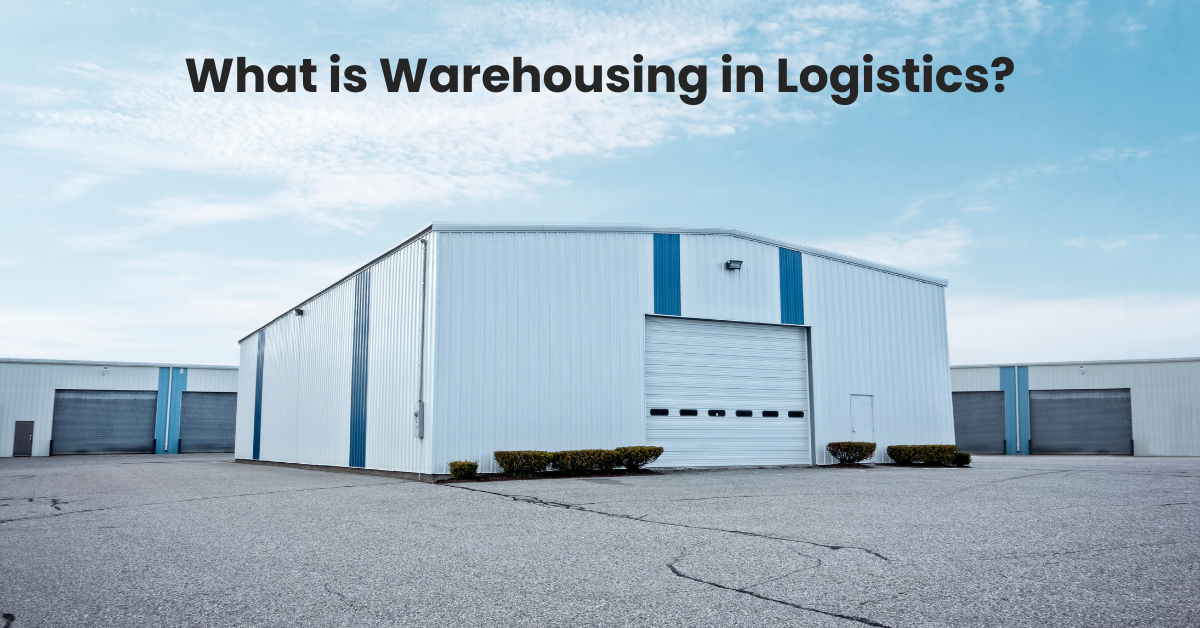What is Warehousing in Logistics? & Its functions in Enterprises

Within the complex domain of logistics, warehousing is essential. It is the foundation of an effective supply chain management system, guaranteeing the smooth handling, distribution, and storage of products. However, what is warehousing in logistics really and how does it work in businesses? Explore the many ways that warehousing in logistics can help organizations succeed by reading this blog post, which will help you unlock its mysteries.
What is Warehousing in Logistics?

Warehousing in logistics refers to the storage and management of goods within a facility, known as a warehouse, as part of the broader supply chain process. Warehousing in ecommerce plays a crucial role in logistics by providing a centralized location for inventory, allowing for efficient storage, handling, and distribution of goods.
What are the Key Aspects of Warehousing in logistics?

Here are key aspects of warehousing in logistics management:
Storage of Goods: The primary function of a warehousing and logistics is to provide a secure and organized space for storing goods. This can include raw materials, finished products, or any items that are part of the supply chain.
Inventory Management: Warehousing and storage in ecommerce logistics involves tracking and managing inventory levels. This includes keeping accurate records of stock levels, monitoring product expiration dates (if applicable), and implementing systems to reorder products when necessary.
Order Fulfillment: Warehousing in logistics are central to the order fulfillment process. When a customer places an order, the goods are often picked, packed, and shipped from the warehouse. Efficient warehouse operations contribute to timely and accurate order processing.
Cross-Docking: Some warehouses use a cross-docking strategy, where incoming goods are directly transferred from inbound to outbound transportation with minimal or no storage time. This approach aims to reduce warehousing cost in logistics and streamline the supply chain.
Distribution: Warehousing in logistics serve as distribution centers, facilitating the movement of goods from manufacturers or suppliers to retailers, wholesalers, or directly to consumers. They play a key role in ensuring that products reach their intended destinations in a timely manner.
Logistics Network Optimization: Companies strategically locate warehouses within their logistics network to optimize the transportation and distribution process. This may involve placing warehouses near major transportation hubs or key markets.
Value-Added Services: Some warehouses offer value-added services such as kitting, labeling, packaging, or product customization. These additional services enhance the flexibility and efficiency of the supply chain.
Technology Integration: Modern warehouses often use technology, such as Warehouse Management Systems (WMS), to automate and optimize various processes. WMS helps with inventory tracking, order processing, and overall warehouse efficiency.
Security and Safety: Warehousing in logistics are designed to provide a secure environment for stored goods. This includes measures such as surveillance systems, access controls, and safety protocols to protect both the goods and the personnel working in the facility.
Reverse Logistics: Warehousing in logistics also play a role in handling returns and managing the reverse logistics process. This involves the efficient processing of returned goods, assessing their condition, and reintegrating them into inventory if possible.
What are the Importance Of Warehousing in Logistics?

Here are some key reasons why warehousing is crucial:
Inventory Management: Role of Warehousing in logistics is important because its provide a centralized location to store and organize inventory, enabling efficient tracking, control, and forecasting of stock levels. This helps businesses avoid stockouts, overstocking, and associated costs, ultimately leading to better inventory management and financial health.
Order Fulfillment and Distribution: Warehousing in logistics act as hubs for order fulfillment, allowing businesses to pick, pack, and ship orders promptly. Their strategic location closer to customer markets can significantly reduce delivery times and improve customer satisfaction.
Cost Optimization: Warehousing in logistics can optimize logistics costs by consolidating shipments and minimizing transportation expenses. It also allows for bulk purchasing of materials, potentially leading to cost savings.
Risk Mitigation: Warehousing in logistics offer a secure and controlled environment for storing goods, protecting them from damage, theft, or environmental factors. This helps minimize losses and ensures the quality and integrity of products until they reach customers.
Value-Added Services: Modern warehousing and supply chain management can offer various value-added services, such as kitting, labeling, and light assembly. These services can streamline operations, enhance efficiency, and add value to products before they reach customers.
What are the Functions of Warehousing in Enterprises?
Here are the top 5 functions of warehousing in enterprises:
Inventory Management
Warehouses play a key role in managing and controlling inventory efficiently. This includes tracking stock levels, implementing systems for accurate inventory control, and minimizing carrying costs.
Order Fulfillment
Warehouses are central to the order fulfillment process, ensuring the timely and accurate picking, packing, and shipping of products in response to customer orders.
Supply Chain Optimization
Warehousing contributes to the optimization of the supply chain by strategically placing facilities to reduce transportation costs, minimize lead times, and enhance overall supply chain efficiency.
Cost Reduction
Warehousing helps enterprises reduce costs by optimizing storage space, preventing stockouts or overstock situations, and implementing efficient inventory management practices.
Distribution Center
Warehouses often function as distribution centers, serving as hubs for the movement of goods between suppliers, manufacturers, and various distribution channels, including retailers and wholesalers.
Conclusion
To sum up, storage plays a crucial role in the complex dance of logistics. It serves as the basis for effective order fulfillment, inventory control, and risk reduction, guaranteeing a seamless flow of goods from manufacturing to the final consumer. Beyond only logistics, warehousing helps firms run more smoothly by assisting with sales, production, and finance. Businesses can realize the full benefits of warehousing and obtain a major competitive advantage in the fast-paced market of today by comprehending its many purposes.

.png)
